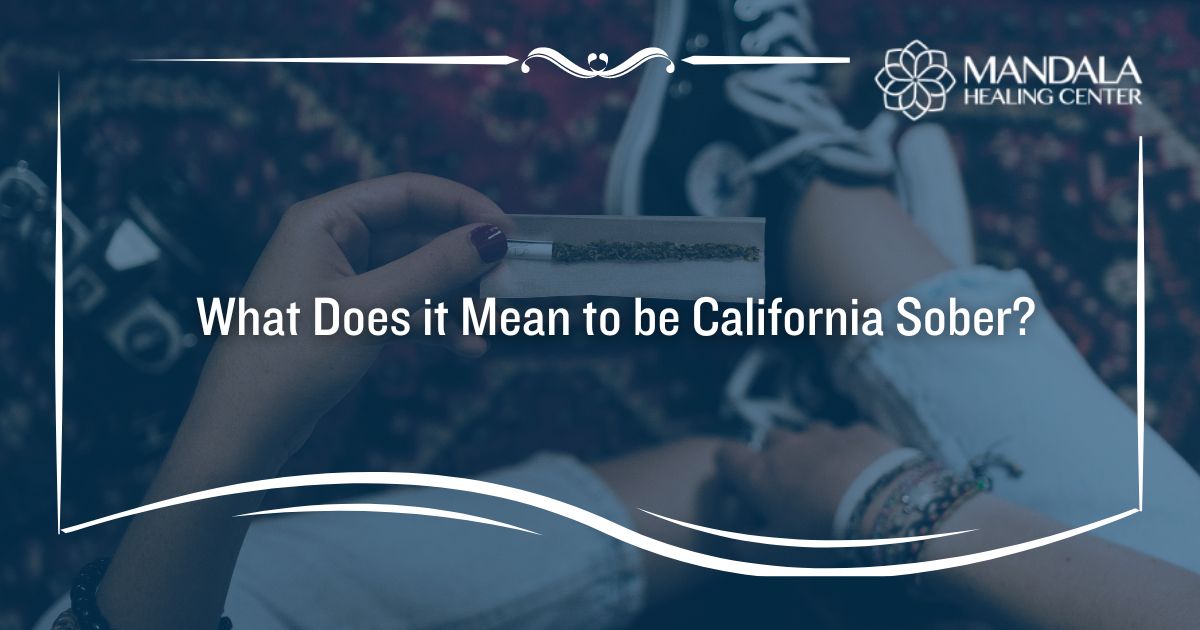Addiction is a chronic and progressive condition that can be difficult to overcome without professional help. According to the Substance Abuse and Mental Health Services Administration (SAMHSA), 48.7 million people struggled with a substance use disorder in 2022.[1]
There are many different paths to recovery, however, most experts agree that full abstinence from drugs and alcohol is the best way to ensure recovery. That said, some people are trying out a new trend known as “California sober.” When someone is California sober, they stay away from “hard” drugs and alcohol and only smoke marijuana.
While marijuana does not lead to life-threatening overdoses or extreme health complications like liver damage, it is still considered addictive. Another issue with continuing to smoke weed during recovery from addiction is that it blurs the lines between which substances are okay and which ones are not. It is a slippery slope, and if you go down it, you might be tempted to abuse other types of drugs and alcohol.
In this article, you will learn:
- What the California sober lifestyle is
- Whether there are benefits to the Cali sober approach
- The risks of being Cali sober
What is the Meaning of California Sober?
California sober or “Cali sober” is a term that describes an approach to sobriety that allows you to smoke weed. Instead of fully committing to abstinence, you stay away from harder drugs and smoke marijuana to cope with the physical and mental health issues you might be dealing with. Some people argue that this approach to sobriety is a form of harm reduction, as it allows you to continue using a mind-altering substance while practicing moderation.
California sobriety was made popular by singer Demi Lovato, who made a song about her journey with smoking weed while in recovery from harder substances. However, she recently came out and admitted that she has gone fully sober and no longer supports the Cali sober approach.
If you have struggled with addiction, it is best to seek help from a drug rehab program. These institutions promote full abstinence because it is the best way to ensure relapses do not occur. At an addiction treatment center, you will have access to specialists, evidence-based therapies, and medications that make it easier to attain full abstinence and long-term recovery.
Are There Benefits of Being California Sober?
While being California sober is not the ideal approach to recovery, there might be some benefit to it. For individuals who are not yet ready to give up all substances, this might be a safer approach to harm reduction. Instead of using IV drugs or consuming substances that can lead to life-threatening overdoses, Cali sober replaces them with marijuana – which is a better alternative when it comes to immediate health.
The National Institute on Drug Abuse (NIDA) has published an essay on harm reduction. This essay states, “Although it may not be ideal or optimal, treating an opioid or methamphetamine use disorder even while a person continues to use marijuana or alcohol would be a net individual and public health benefit.”[2]
It is also important to note that some people use marijuana for medicinal reasons in certain states. If you are prescribed cannabis to treat something like chronic pain, you might have to consider being California sober. With this approach, you will continue to stay away from alcohol and hard drugs and treat your ailment without using opioids, which is an accomplishment.
What are the Risks of Being Cali Sober?
While Cali sober can be a good option for harm reduction, it should never be the end goal. There are some risks of continuing to smoke weed while you are in recovery from addiction. Being aware of these risks might motivate you to seek additional help to achieve full abstinence.
The main risks of the Cali sober lifestyle choice include:
Cannabis Addiction
Unfortunately, marijuana is still considered an addictive substance. If you are newly sober from drugs or alcohol, smoking weed could become a new addiction. According to the Centers for Disease Control and Prevention (CDC), 3 in 10 people who use marijuana suffer from cannabis use disorder.[3]
Masking Underlying Issues
If you are using marijuana to cope with daily life and the stress that comes with it, you might be masking underlying issues that could be treated with therapy. For example, marijuana can mask emotions that contribute to the disease of addiction. By using cannabis, you are preventing yourself from recovering from the underlying causes of your substance use disorder.
Relapse
Lastly, using a mind-altering substance like marijuana could blur the lines between which substances are okay to use and which ones are not. You could feel tempted to use other “natural” substances like psilocybin mushrooms or ayahuasca. Eventually, this could cause you to experience a full-blown relapse with your previous drug of choice.
Find Help for Marijuana Abuse and Addiction
If you or a loved one tried the Cali sober lifestyle and developed an addiction to weed, it’s time to seek help. While marijuana does not lead to fatal overdoses, being addicted to it can negatively impact your daily life and mental health. Thankfully, drug rehab programs like Mandala Healing Center can help you regain control over your life.
Contact us today for more information about our marijuana addiction treatment center.
References:
- The Substance Abuse and Mental Health Services Administration (SAMHSA): HHS, SAMHSA Release 2022 National Survey on Drug Use and Health Data
- The National Library of Medicine (NLM): Making Addiction Treatment More Realistic and Pragmatic: The Perfect Should Not Be the Enemy of the Good
- The Centers for Disease Control and Prevention (CDC): Understanding Your Risk for Cannabis Use Disorder












